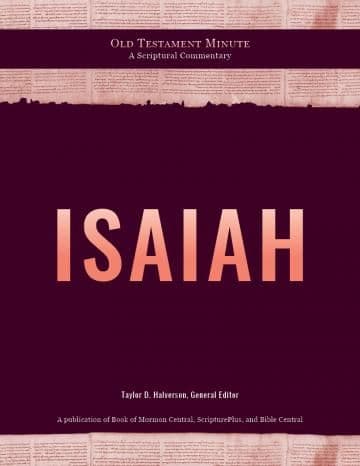Book
34 Chapters

The chapter break between Isaiah 3 and 4 should be ignored, as the narrative continues with seven of these mourning, desolate women, perhaps war widows, taking hold of one man and begging him to allow them to support themselves with food and clothing, “only let us be called by thy name! Take away our reproach.” The word reproach here can also be translated as disgrace.
During this period a woman was shamed if she was not married or was childless. In fact, after some time the childless woman would be returned to her father and was considered unmarriageable and would live out her life with her father or brothers to protect her.[1] Marriages were brokered by two sets of parents while the child whose marriage was being arranged had little opportunity to consult with anyone. The protection of a daughter was always the responsibility of her father and her brothers. Upon marrying, that responsibility shifted to her husband, but if she did not bear him a child, he could send her back to her father’s house. Genesis 34 explains wonderfully much of the arranged marriage process in ancient Israelite culture and the protection a father and brothers provided their daughter or sister. In this case, she was “defiled,” and her brothers take drastic steps to retaliate. However, Jacob was angry with his sons for their actions.
These initial verses may remind you of sacrament emblems and symbols. And the women begging “Let us be called by thy name” reminds one of our weekly covenant of willingness to “take His (Christ’s) name upon us.” This is similar to Jeremiah 15 and Doctrine and Covenants 18:
Thy words were found, and I did eat them; and thy word was unto me the joy and rejoicing of mine heart: for I am called by thy name, O Lord God of hosts. (Jeremiah 15:16)
“The Twelve shall be my disciples, and they shall take upon them my name; . . . they shall desire to take upon them my name with full purpose of heart. (Doctrine and Covenants 18:27)
4:2. This verse speaks of a specific time: “In that day.” What day? Note that 4:1 also begins with the same phrase: “In that day.” These are likely occurring at the same time, although it is difficult to know for sure. The prophecy continues with a positive view of the future: “The branch of the Lord will be beautiful and glorious, and the fruit of the land will be the pride and glory of the survivors.” Who are the “survivors”? What fruit is Isaiah referring to?
Two interesting facts may be relevant here:
Next he speaks of those who are alive in Jerusalem after the city has been cleansed or purged by burning, even describing how this will happen after the Lord has “washed away the filth of the daughters of Zion.” Note, once again, that reference so daughters here are a metaphor for all the unclean inhabitants of Jerusalem, not just the women.
4:3–4. In other words, those who were worthy or sanctified sufficiently to stand in the Lord’s presence were the only ones left.
We are even promised in Isaiah 4:6, as rendered in the NIV, “Then will the Lord create over all of Mount Zion, and over those who assemble there, a cloud (or pavilion or tent or covering) by day and a glow of flaming fire by night. It will be a shelter and shade from the heat of the day and a refuge and hiding place from the storm and rain.”
Orson Pratt suggested that the fulfillment of this prophecy would be literal.
But in the latter days there will be people so pure in Mount Zion with a house established upon the tops of the mountains, that God will manifest Himself, not only in their temple and upon all their assemblies, with a visible cloud during the day, but when the night shall come, if they shall be assembled for worship, God will meet with them by his pillar of fire: and when they retire to their habitations, behold each habitation will be lighted up by the glory of God, - a pillar of flaming fire by night.
Did you ever hear of any city that was thus favored and blessed since the day that Isaiah delivered this prophecy? No, it is a latter-day work, one that God must consummate in the later times when he begins to reveal himself, and show forth his power among the nations.[2]
[1] For a disturbing example of this that nevertheless demonstrates the point, see Genesis 34.
[2] Orson Pratt, in Journal of Discourses, 26 vols. (Liverpool: F. D. Richards, 1855–1886), 16:82.
Book
34 Chapters
Items in the BMC Archive are made publicly available for non-commercial, private use. Inclusion within the BMC Archive does not imply endorsement. Items do not represent the official views of The Church of Jesus Christ of Latter-day Saints or of Book of Mormon Central.